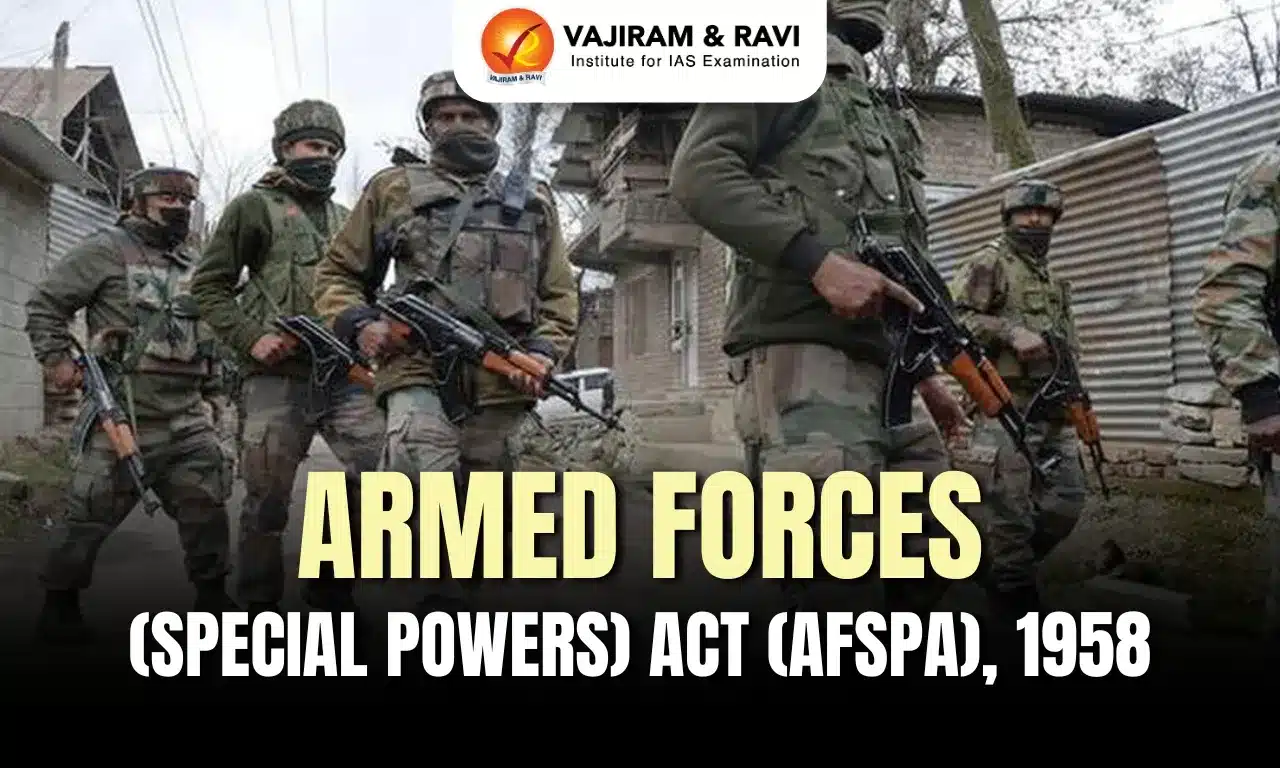Armed Forces (Special Powers) Act (AFSPA),1958 Latest News
The Assam government recently extended the Armed Forces (Special Powers) Act (AFSPA), 1958, in three districts for another six months.
About Armed Forces (Special Powers) Act (AFSPA),1958
- It is a law enacted by the Parliament in 1958 which gives the armed forces special powers and immunity to maintain public order in “disturbed areas”.
- When is it applied? It can be applied only after an area has been declared “disturbed” under section 2 of the Act.
- Declaration of Disturbed Areas:
- Defined under Section 3 of the Act, a “disturbed area” is where the use of armed forces is deemed necessary to support civil authorities in maintaining law and order.
- An area can be declared disturbed due to conflicts or disputes between various religious, racial, linguistic, regional, or caste-based communities.
- The central government, Governor of the state, or the administrator of the Union Territory can declare the whole or part of a state or union territory as a disturbed area.
- Once declared, the region is maintained as disturbed for at least three months under The Disturbed Areas (Special Courts) Act, 1976.
- The scope and duration of AFSPA can vary depending on the region’s security situation.
- The ‘special powers’ of armed forces under AFSPA are:
- They have the authority to prohibit a gathering of five or more persons in an area, can use force even to cause death or even open fire after giving due warning, if they feel a person is in contravention of the law.
- If reasonable suspicion exists, the army can also arrest a person without a warrant, enter or search a premises without a warrant, and ban the possession of firearms.
- Any person arrested or taken into custody may be handed over to the officer in charge of the nearest police station along with a report detailing the circumstances that led to the arrest.
- These armed forces are immune from prosecution unless the Union Government provides sanction to the prosecuting agencies.
- Where is AFSPA in force now? Currently, AFSPA is active in Assam, Manipur, Nagaland, Arunachal Pradesh, and the UT of J&K.
Source: NOA
Last updated on December, 2025
→ Check out the latest UPSC Syllabus 2026 here.
→ Join Vajiram & Ravi’s Interview Guidance Programme for expert help to crack your final UPSC stage.
→ UPSC Mains Result 2025 is now out.
→ UPSC Notification 2026 is scheduled to be released on January 14, 2026.
→ UPSC Calendar 2026 is released on 15th May, 2025.
→ The UPSC Vacancy 2025 were released 1129, out of which 979 were for UPSC CSE and remaining 150 are for UPSC IFoS.
→ UPSC Prelims 2026 will be conducted on 24th May, 2026 & UPSC Mains 2026 will be conducted on 21st August 2026.
→ The UPSC Selection Process is of 3 stages-Prelims, Mains and Interview.
→ UPSC Result 2024 is released with latest UPSC Marksheet 2024. Check Now!
→ UPSC Prelims Result 2025 is out now for the CSE held on 25 May 2025.
→ UPSC Toppers List 2024 is released now. Shakti Dubey is UPSC AIR 1 2024 Topper.
→ UPSC Prelims Question Paper 2025 and Unofficial Prelims Answer Key 2025 are available now.
→ UPSC Mains Question Paper 2025 is out for Essay, GS 1, 2, 3 & GS 4.
→ UPSC Mains Indian Language Question Paper 2025 is now out.
→ UPSC Mains Optional Question Paper 2025 is now out.
→ Also check Best IAS Coaching in Delhi
Armed Forces (Special Powers) Act (AFSPA), 1958 FAQs
Q1. The Armed Forces (Special Powers) Act (AFSPA) was enacted by the Parliament in which year?+
Q2. Who has the authority to declare an area as “disturbed” under AFSPA?+
Q3. AFSPA is currently in force in which regions?+

















